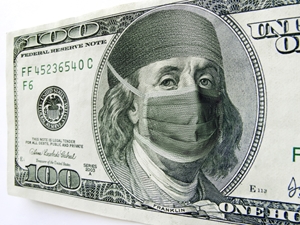
The Affordable Care Act has helped push the national uninsured rate down below 12 percent for the first time in well over a decade, helping more people who don't have access to employee benefits with an alternative way of paying for medical treatment.
But beyond that, there's not a whole lot that Americans are getting from Obamacare, other than a hefty hit to the wallet, according to a newly released survey.
Be it financial or practical, only 15 percent of people in the United States say they've personally gotten an advantage thanks to the ACA, based on a new jointly performed poll from National Public Radio and the Robert Wood Johnson Foundation. In fact, at 56 percent, a majority of respondents indicated that they haven't been affected by the health care law in one way or another, The Hill reported. And of those who have, more people have been affected negatively than positively. More specifically, over 1 in 4 said that they're in worse shape now than they were prior to health care reform going into effect a few years ago, requiring all Americans to buy coverage.
When supporters of the health care overhaul were promoting the ACA several years ago, advocates indicated that the law had the potential to save families thousands of dollars per year in annual premiums. It's been quite the opposite for many people who get coverage through the state or federal exchanges. The NPR/RWJF study revealed that over one-third of Americans are paying more for health coverage today than they were two years ago. Additionally, 1 in 5 are shelling out more for prescription drug medications.
One-third have put off medical treatment in last year
The report's findings mirror what other polls have determined: that the cost of health care continues to rise, and at an unsustainable clip. In the past year, nearly 1 in 3 Americans have put off medical treatment of some kind because the cost was too expensive to afford, according to a survey done by Gallup this past November. That figure has remained relatively constant since 2010, several years prior to the ACA going into effect.
Robert Blendon, Ph.D., professor of health policy and political analysis at Harvard T.H. Chan School of Public Health, stated that if there's one thing that needs to be fixed with regards to the health care law, it's the copious amounts of money that families are spending.
"It is clear from the poll that health care costs should top the agenda for what needs to be done in the future," Blendon explained.
Blendon added that in several states – particularly in the South and Midwest – many people are having trouble paying off their medical bills. Some of the most hard-hit states included Florida, Texas, Kansas and Wisconsin.
HHS: 8 in 10 qualify for subsidies
With medical costs rising much faster than wages, the federal government has made attempts at lowering policyholders' health premiums. The U.S. Department of Health and Human Services let it be known in January that 80 percent of exchange users qualified for tax credits this past enrollment season, saving an average of almost $300 per month. That's the equivalent of roughly 72 percent of the pre-tax credit premium.
The financial fallout has also been felt by producers. The Associated Press reported that UnitedHealth, the largest health insurance provider in the country, stands to lose as much as $475 million this year alone due to the regulations and requirements that the ACA mandates in order to participate in the exchanges.
Katherine Hempstead, director of health insurance coverage programs at the RWJF, told the AP that the health care law – and the marketplaces policies are selected from – has a long way to go before it actually lives up to its "affordable" namesake.
"Sometimes I think of (the exchanges) as a little campfire that's going to grow," Hempstead noted. "But right now, it needs a little more oxygen or kindling."





